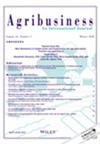The impact of adopting sustainable agricultural practices with or without chemical pesticides on farmers' technical efficiency: Evidence from rural Burkina Faso
IF 2
3区 经济学
Q2 AGRICULTURAL ECONOMICS & POLICY
引用次数: 0
Abstract
This study analyzes the impact of adopting sustainable agricultural practices (SAPs) with or without chemical pesticides on farmers' technical efficiency. We compared three groups of farmers: nonadopters, those adopting SAPs and using chemical pesticides, and those adopting SAPs in the pesticide‐free mode. The study data covered 1912 rural households in Burkina Faso for the 2016–2017 agricultural season. We used an endogenous frontier model and a matching method to address sample selection for both observables and unobservables. The results show that the adoption of pesticide‐free SAPs reduces technical inefficiency compared with the practice of adopting SAPs with pesticides and nonadoption of SAPs. However, our findings show that compared with the nonadoption of SAPs, adoption of SAPs with chemical pesticides did not have a significant effect on technical efficiency. For more efficient and sustainable agriculture, policies should further promote SAPs while advancing biological pest management techniques, as opposed to the use of chemical pesticides. [EconLit Citations: Q1, Q12, Q15, Q16, Q56].采用或不采用化学农药的可持续农业实践对农民技术效率的影响:来自布基纳法索农村的证据
本研究分析了采用或不采用化学农药的可持续农业实践(SAP)对农民技术效率的影响。我们对三组农民进行了比较:非采用者、采用 SAP 并使用化学农药的农民和采用 SAP 无农药模式的农民。研究数据涵盖布基纳法索 2016-2017 年农季的 1912 个农村家庭。我们使用了内生前沿模型和匹配方法来解决可观测变量和不可观测变量的样本选择问题。结果表明,与采用含农药的农业结构调整方案和不采用农业结构调整方案的做法相比,采用不含农药的农业结构调整方案降低了技术无效率。然而,我们的研究结果表明,与不采用结构调整方案相比,采用含化学农药的结构调整方案对技术效率没有显著影响。为了提高农业的效率和可持续发展,政策应进一步推广 SAP,同时推进病虫害生物防治技术,而不是使用化学农药。[经济学引文:问题 1、问题 12、问题 15、问题 16、问题 56]。
本文章由计算机程序翻译,如有差异,请以英文原文为准。
求助全文
约1分钟内获得全文
求助全文
来源期刊

Agribusiness
农林科学-食品科技
CiteScore
5.50
自引率
6.20%
发文量
58
审稿时长
6 months
期刊介绍:
Agribusiness: An International Journal publishes research that improves our understanding of how food systems work, how they are evolving, and how public and/or private actions affect the performance of the global agro-industrial complex. The journal focuses on the application of economic analysis to the organization and performance of firms and markets in industrial food systems. Subject matter areas include supply and demand analysis, industrial organization analysis, price and trade analysis, marketing, finance, and public policy analysis. International, cross-country comparative, and within-country studies are welcome. To facilitate research the journal’s Forum section, on an intermittent basis, offers commentary and reports on business policy issues.
 求助内容:
求助内容: 应助结果提醒方式:
应助结果提醒方式:


